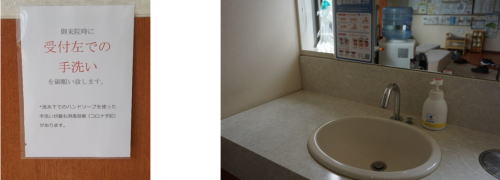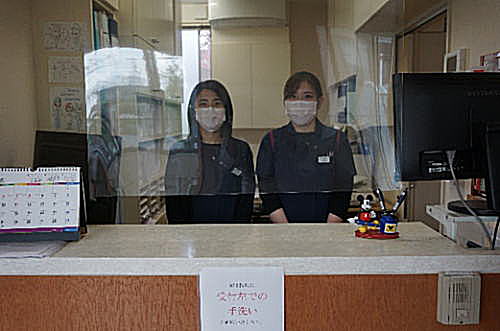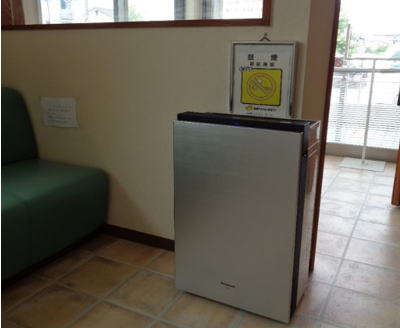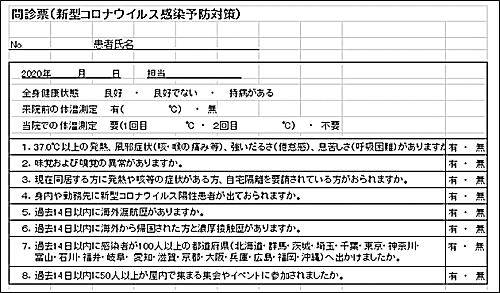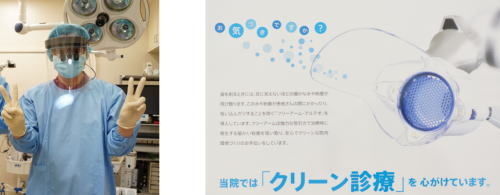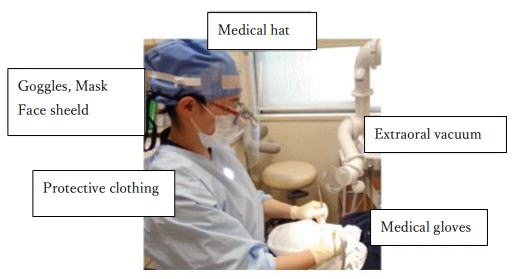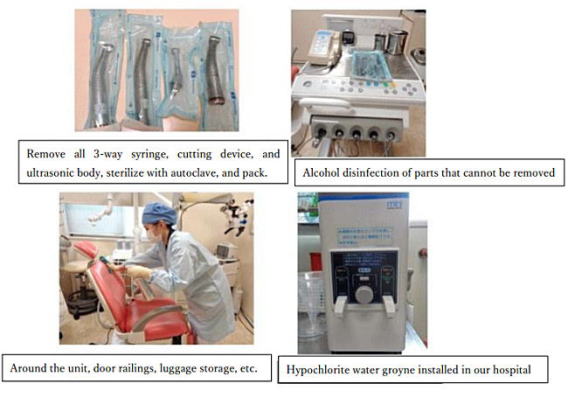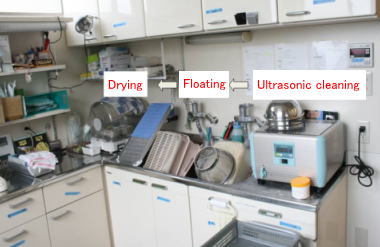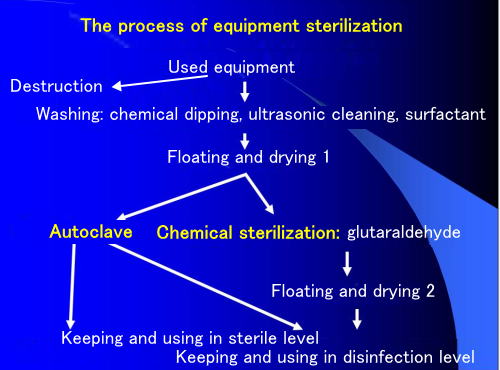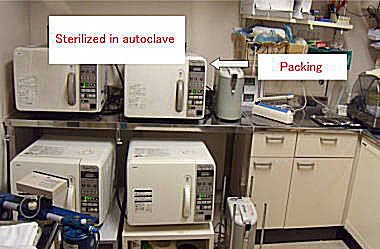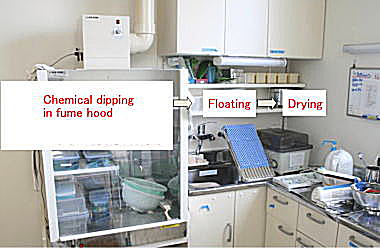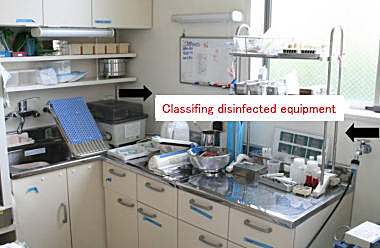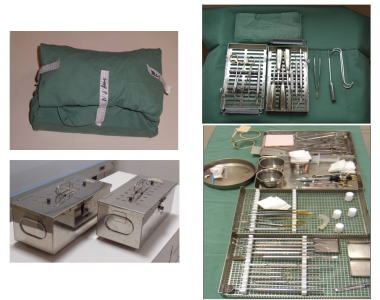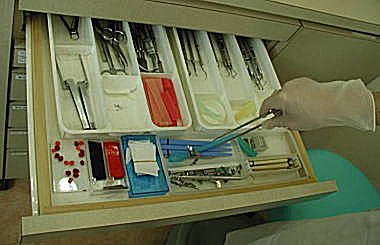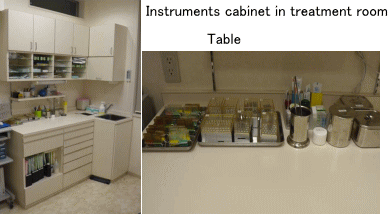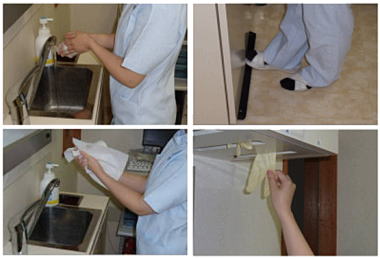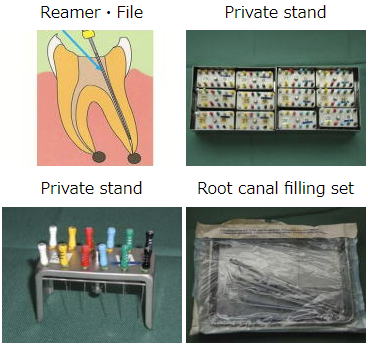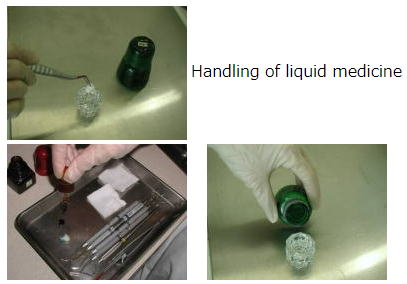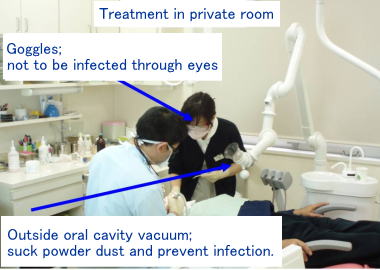|
|
“Sterilization, disinfection and nosocomial infection control” are some
of the strength of our office.
|
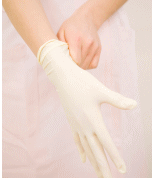
Dental treatment from the comfort of polished and fillings tend to neglect
these.
However, there will be bleeding during dental treatment. For example, sharpening
the teeth will cause gums and nerves to bleed. During surgical treatments
such as periodontitis and implant operation, it will also.
Dental care can happen with inadequate sterilization, however beware of
getting infected by germs from previous patient.<br>
Next patient could possibly be infected from hepatitis and AIDS.
Our clinic conducts through sterilization and disinfection process to avoid
nosocomial infection.
|
|
|
|
At our hospital, all staff are careful not to get COVIT19. We are working
on measures against COVIT19 so that patients can go to the hospital. We
apologize for any inconvenience caused and appreciate your understanding
and cooperation.
~Measures in the waiting room~
1. Washing hands at the time of visit
Patients who come to our hospital are asked to wash their hands on the
left side of the reception. The faucet is non-contact type and allows hot
water to come out, so it can be used comfortably even in cold weather.
Alcohol disinfectant is also installed next to the reception, so please
use it. Washing hands with soap is more effective than alcohol disinfection,
so we recommend that patients wash their hands.
2. Reception protective sheet
A protective sheet is installed at the reception to prevent splashing of
patients and reception staff.
3. Removal of toys and magazines
We are currently removing toys, magazines and newspapers to prevent contact
infections between patients.
4. Cluster prevention measures in the waiting room
Currently, we are adjusting the time to prevent congestion in the waiting
room and reducing the number of reservations for medical treatment. To
prevent clusters, patients may be asked to wait in a separate room or in
the car.
5. Installation of hypochlorous acid air purifier (Ziaino)
A hypochlorous acid air purifier (Ziaino) is installed near the entrance.
The staff regularly cleans and manages it. In addition, the waiting room
is ventilated by opening windows, and we always try to maintain a clean
space.
Measure in the examination room
1. Questionnaire, temperature measurement and mouthwash disinfection
In the examination room, we ask eight questions such as the health condition
of the day, body temperature, past behavior history, and whether there
are any positive person close to you. we will measure the temperature in
the examination room for patients who have not measured their body temperature.
The thermometer is wiped and disinfected with alcohol before storage. In
addition, patients are asked to wash and disinfect the oral cavity with
hypochlorite water before medical treatment.
2. Patient and staff protection (surgical mask, protective clothing, face
shield, wearing goggles, use of extraoral vacuum)
Patients are covered with towels to cover their faces to prevent them from
being covered with splashes generated during medical treatment. In addition,
we have installed an extraoral vacuum in each examination room. Extraoral
vacuum sucks in droplets such as germs and dust that come out during medical
treatment (please check our COVIT19/Infection control). By using an extraoral
vacuum, the amount of droplets on patients and medical staff can be reduced,
and a clean space can be maintained. In addition, we provide medical care
by changing the gloves for each patient, so you can receive medical care
with peace of mind.
To protect the staff, all staff (including reception staff) wear surgical
masks.
The staff who perform treatment wear protective clothing and a medical
hat to prevent splashes on the skin and hair. * 1
We make sure that we do not use the same protective clothing and medical
hat in the first half and the second half, and change into new ones during
the lunch break.
In addition, we wear face shields and goggles to prevent splashes from
directly touching the staff's face and eyes. The lab coats, protective
clothing, medical hats, patient towels, etc. used are frequently washed
at our hospital and always worn and used clean.
State at the time of actual medical treatment
3. Ventilation and disinfection of the examination room (using alcohol
and hypochlorite water)
After each patient's medical treatment, the window is opened and the extraoral
vacuum is operated to ventilate the patient's room. Also, in the summer,
we operate a fan to ventilate. While ventilating, the clinic is disinfected
with hypochlorite water. At our hospital, we introduced a hypochlorite
water maker when the new coronavirus began to spread, and we have been
able to fully use the hypochlorite water made by the water maker. Learn
how to make and use hypochlorite water, and thoroughly wipe off and disinfect
anything that comes into contact with the examination room, such as the
table, door railings, patient luggage storage, and keyboards. All medical
instruments used in the patient's oral cavity are packed in an autoclave
sterilizer. (Please check our COVIT19/Infection control) In addition, all
non-removable motors and hoses are disinfected with alcohol.
Staff education
Contents
- Understanding the route of infection
- Correct hand washing and finger disinfection
- About putting on and taking off gloves
- How to manage and use hypochlorite water
- Understanding the actual situation of the new coronavirus and overseas
viruses
- Behavior as a medical person (such as not going to the downtown area etc.)
We believe that it is important for each staff member to have a common
understanding of the new coronavirus, and we are educating our staff members.
We have actively learned about the actual condition of coronavirus and
the effect of hand disinfection at in-hospital seminars and online seminars.
We think it is necessary to have knowledge about the new coronavirus so
that even if a positive person appears near us, we will not panic and can
make a calm judgment. In order to utilize the knowledge gained through
staff education in our actions, we have continued to discuss with the staff
about the revision of infection control measures, infected people, and
measures to prevent clustering. All the staff are strongly aware that they
will not be infected as medical personnel. We will continue to educate
our staff regarding the new coronavirus and strive to be a dental clinic
that thoroughly prevents infection.
We are working on new measures for the new variant of covid 19 virus, Omicron.
All our staff will continue to work hard to protect you from the infection
and to provide high quality dental service without any fear.
When a staff in our office became positive or probable positive to covid
19 virus or a suspect with the close contact,
- We will suspend a staff to come to our office, who became positive, close
contacts or with some covid 19 symptoms.
- We will close our office temporarily, for about 3 hours, to inspect and
disinfect the office or staffs, etc.
- We will perform antigen tests for covid 19 against all of the other staffs.
- We may open and resume clinical work by only the staffs with negative reaction
to covid 19 virus antigen test.
- We will disclose all of the related information to our clients.
Sterilization, disinfection and nosocomial infection control
|
|
At first, separating discarded equipment from reused.
Reuse things will be dipped in chemical liquid, washed, floated, dried
and autoclave and kept in sterile level.
Equipment can be not put in autoclave will dipped in chemical liquid.<br>
After that, they are floated, dried and kept in disinfection level.
Disinfection and sterilization in specious sterilizing room
Placement: classified used things from clean thing
Washing stains such as blood in large ultrasonic cleaner, and drying.
|
 |
|
After we pack equipment in sterile bags,
they will be put in autoclave.
Six units(incruding two express autoclaves)
are full operated.
|
 |
|
プラスチック類のオートクレーブをかけられない器材は、ドラフトチャンバーの中で、薬液滅菌をします。チャンバーを使って有毒ガスが室内に出ないようにしています。十分に水洗した後、乾燥します。
|
 |
|
Not to mixed with used equipment, we will classify clean things here.
|
Point
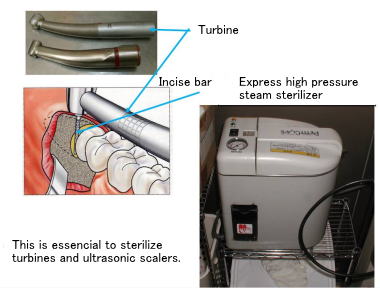 |
|
Doctors polish teeth by turbine so it gets dirty with patients’ blood.<
Turbines will be cleaned in two express autoclaves.
|
|
|
|
Instruments used in surgical treatments such as extract and implnat are
kept in sterile level with each treatment set.
Supplementing instruments are packed individualy.
|
|
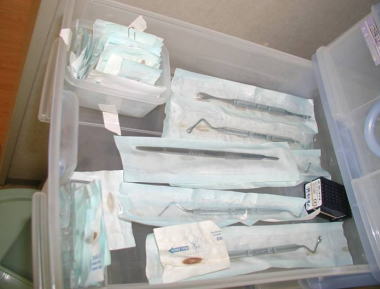 |
|
|
Apparatus for refilling the individually packed and kept in sterile level.
|
|
|
|
Instruments used in generals are kept in disinfection level.
We pick them with clean tweezers, so other instrument will not get dirty.
|
|
|
We have enough space not to be infected.
1 or 2 sinks are in each room and faucets are foot pedal style.
We use paper towels not towels and use new globes the in every patient.
|
|
|
A set of basic instruments
|
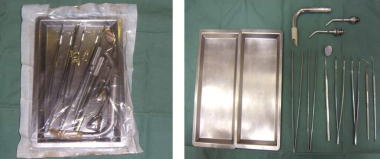 |
|
We ready a set of basic instruments which used in all treatment.
It has two trays, vacuum chip, air syringes, tweezers; two straight and
two curved, mirror and two probes.
|
|
|
|
The instruments are sterilized in every time.
|
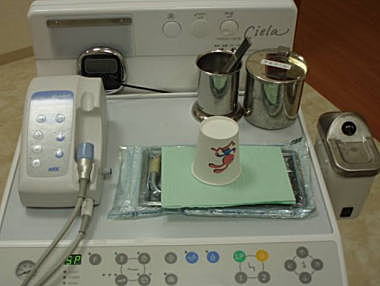 |
|
A set of basic instruments on treatment table
In addition to the set, we ready disposable cup and aepron in evety patient.
|
|
|
Private stands for each patient
|
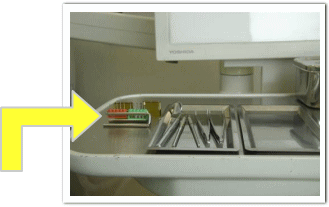 |
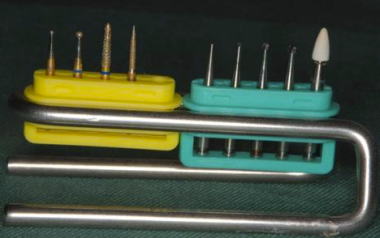 |
|
We put clean bars on private stand when we polish teeth.
We also sterilize reamers, files and root canal filling sets which used
in root canal treatments.
|
We do not put tweezers or brushes into bottles.
We dispense for every treatment and dump the rest.
|
|
|
No cross infection Resin
|
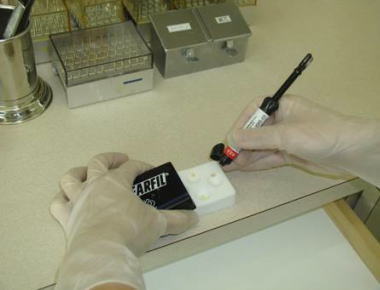 |
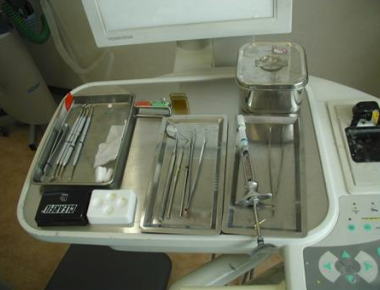 |
We also ready filling materials in every patient and dump the rest.
|
|
|
We have outside oral cavity vacuum in each room.
You will not suck dusts from other people’s treatment because of private
rooms.
Operators use goggles to protect their eyes.
It is important to prevent operators from infection to prevent patients
from that.
|
|
|
|
Outside oral cavity vacuum prevents you from powder dust infection.
|
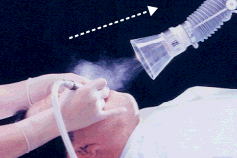 |
|
Bacteria and power dusts are thrown up in air. It means you may suck the
other patient’s teeth dusts; droplet infection.
We use powerful outside oral cavity vacuum to protect you from that infection.
We promise safety and clean treatments.
|
On May 18, 2014, the Yomiuri Shimbun published a shocking report that about
70% of dental clinics reuse cutting instruments without sterilizing them.
Unfortunately, it is a fact that dental clinics do not take thorough infection
control measures, and there is a risk that infections such as hepatitis
B may occur during daily dental treatment. In order to protect the patients
who visit our hospital, we have thoroughly implemented nosocomial infection
control measures based on scientific evidence since the opening of the
hospital in 2000.
In addition, not only for our hospital, but also for dental care as a whole,
we have raised issues regarding hospital-acquired infection control in
Japan to medical professionals. However, the current situation is that
no countermeasures have been taken. The main causes are low medical fees
for dental treatment, inadequate administrative supervision centered on
the Ministry of Health, Labor and Welfare, inadequate legislation against
nosocomial infections, and low awareness and morals among dental care workers.
Therefore, at Kuranoue Ichimaru Dental Clinic, we hereby declare the following
so that not only our clinic but also all patients at dental clinics in
Japan can receive safe and secure dental treatment.
|
|
|
- At Kuranoue Ichimaru Dental Clinic, we will continue and enhance the "anti-nosocomial
infection control based on scientific evidence" that has been thoroughly
implemented since the opening of the clinic in 2000.
- At Kuranoue Ichimaru Dental Clinic, we continue to sterilize and disinfect
all instruments and equipment, including cutting instruments, as one of
the measures against nosocomial infections.
- At Kuranoue Ichimaru Dental Clinic, regular in-hospital training sessions
are held, and all staff engage in dental treatment with scientifically-based
knowledge of nosocomial infection control.
- We will do our utmost to improve the awareness and knowledge of dental
professionals so that the measures against nosocomial infections in Japanese
dental clinics will proceed smoothly.
- We strongly recommend dental organizations and governments to thoroughly
investigate and publicize the current state of nosocomial infection control
in Japanese dentistry and cases of suspected nosocomial infections.
- We strongly recommend that dental organizations and governments develop
legislation to prevent nosocomial infections in Japan.
- We strongly recommend to the Ministry of Health, Labor and Welfare to reflect
the costs necessary for infection control in medical fees so that all dental
clinics in Japan can permanently implement measures against nosocomial
infections.
|
|
